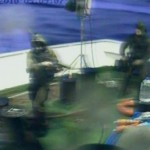Israel Has No Option but Victory
 If Muslim countries lay down their weapons, there would be peace; if Israel laid down its weapons – there would be no more Israel. That is the sorry reality of the Middle East today, as it was 60 years ago.
If Muslim countries lay down their weapons, there would be peace; if Israel laid down its weapons – there would be no more Israel. That is the sorry reality of the Middle East today, as it was 60 years ago.
It’s hardly a surprise that criticism of Israel for its commando raid on the so-called “aid flotilla” to Gaza, far exceeds the support Israel is getting.
Nor is it a surprise that Israel’s PM, Benjamin Netanyahu, seems unmoved by international criticism, and will continue the blockade which he and others see as necessary to keep Iranian weapons out of the hands of Hamas in Gaza.
Israel’s official defense of its blockade policy is more justified than its complaint that violence was used against commandos who rappelled from helicopters on to the deck of the Mavi Marmara.
Be it unwarranted arrogance or excessive confidence, the Israelis should have known better than to board and try to take over a Turkish ship in international waters, armed with paintball guns and rubber bullets.
And how can the crew be blamed for fighting back? After all, they were Turks, and Turks are not known for doing much backing down.
While there is debate and disagreement within Israel about the wisdom of the commando raid (Israel is the only democracy in the Middle East and the only one that tolerates internal dissent) there is also one overwhelming reality that cannot be easily dismissed.
If Muslim countries lay down their weapons, there would be peace; if Israel laid down its weapons – there would be no more Israel. That is the sorry reality of the Middle East today, as it was 60 years ago.
Those who genuinely seek “peace” in the Middle East -- and not aid flotillas to lure the Israelis into attacking – should concentrate on persuading Israel’s enemies to give peace a chance.
Organizers of this particular flotilla seem mostly aligned against the very idea of Israel’s existence – including the great Swedish crime novelist, Henning Mankell (my favorite) who was on one of the ships as a protest against Israel’s blockade.
An argument can be made that Israel is especially subjected to vicious criticism when it fails. When it succeeds, there is still criticism but cautious criticism. One can imagine the reaction in past wars if it had lost instead of winning quickly and decisively.
Israel’s 2007 air strike on a Syrian weapons site where nuclear supplies from North Korea had been delivered, intended for Iran, didn’t amount to much because it was so successful.
On the other hand, Israel’s invasion of Lebanon in the early 1980s, which stalled outside Beirut, and then withdrew, attracted enormous criticism – not just for the invasion, but for not following through and not succeeding.
In both politics and war, success is the prime virtue, failure the cardinal sin.
Another reality that no one seems interested in contemplating, is that among Arab countries, Palestinians are neither liked nor trusted. They are useful in efforts against Israel, but no Arab country looks favorably on an independent Palestinian state.
The Palestine Liberation Organization was kicked out of Egypt 40 years ago. King Hussein them tossed them out of Jordon. In Lebanon they were so destructive that Syria invaded to keep them in line. Palestinians are a bit like Israelis – clever, resourceful, competent and untrustworthy.
Compared to the homicidal militancy of Hamas, the Palestinian Authority of Mahmoud Abbas seems almost benign. But Netanyahu has been so adamant about settlements on the West Bank that it deters flexibility by the PA. Maybe this will now change.